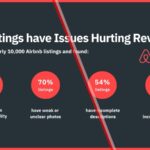Maui Softens Short-Term Rental Ban Amid Tourism Pressure
- Maui’s controversial plan to eliminate over 7,000 short-term rentals (STRs) is again in flux.
- County officials are now proposing to preserve 4,519 units, most from the long-standing Minatoya list of apartment-zoned condos that have legally operated as vacation rentals for decades.
- The idea is to rezone them into new hotel-style categories, H-3 and H-4, effectively shielding them from phase-out.
- These units are primarily located in Kihei and Lahaina, Maui’s core visitor hubs.
- The timing is notable, just days earlier, National Geographic featured Maui on its Best of the World 2026 list, underscoring the island’s global tourism value.
- While the earlier proposal under Bill 9 remains on the table with a November vote scheduled, this new direction shows a clear attempt to walk back a full ban and avoid damaging the visitor economy.
- Still, 2,500+ units remain unprotected under the rezoning plan. Their future is unclear, and no formal enforcement dates have been announced for either the original bill or the new proposal.
Snigdha’s Views:
- This is another sharp U-turn in Maui’s long-running STR saga. From bans and economic studies to backlash and political stalling, the county is now floating a compromise to defuse growing pressure.
- Labeling the rezone as a “lateral move” avoids the optics of expansion, but the message is clear: a full-scale STR ban is no longer politically viable.
- If passed, this model, preserving long-standing rentals by creating new zoning buckets, could set a precedent for other destinations trying to balance housing access with tourism revenue. But it’s not a done deal. With council votes still pending.
- For property managers, the proposal offers partial relief, but no final clarity. It’s a signal to stay engaged in local advocacy, prepare contingency plans for affected units, and proactively communicate with guests already booking into 2026.
Boom Unveils “BAM,” an Agentic AI Manager for Short-Term Rental Operations
- Boom, a Miami-based AI-powered property management software company, has launched BAM (Business Agentic Manager).
- The company calls it a next-gen AI system that can autonomously handle guest messaging, reporting, marketing, and review responses for STR operators.
- The launch comes just after Boom closed a $12.7 million funding round led by Avenue Growth Partners.
- Unlike traditional automation tools that focus on individual tasks, BAM is pitched as an agentic AI system that learns from operational patterns and runs workflows with minimal human intervention, part of what Boom now brands as “Business as a Software.”
- According to Boom, early adopters report that BAM now manages 75% of guest communication, replies to all reviews autonomously, and has cut response times by 80%.
- Zzzing, a Malta-based operator, noted faster decision-making and reduced manual workload during early rollout.
- BAM is already active in 20+ countries and is being positioned for broader rollout among mid- to large-scale operators.
About Boom:
Boom is an AI-driven property management software (PMS) built to simplify short-term rental operations. It provides tools for managing reservations, automating guest communication, coordinating housekeeping and maintenance, and tracking financials like payments and expenses, aiming to ensure seamless property oversight.
Snigdha’s Views:
- Many property managers today juggle multiple tools, like an AI chatbot for guests and a separate platform for reporting. This setup may work for 10 listings, but by 30 or 50, it breaks down: slower replies, scattered data, and constant manual follow-ups.
- Boom is trying to stitch all of this together under one roof. With BAM, they’re betting on AI that can run the business logic.
- This follows their steady progression: Andi (AI guest support), Steve (AI sales agent), and their claim of the industry’s first fully AI-powered PMS.
- The promise here is tempting: BAM can handle guest messages so teams can focus on exceptions, write consistent review replies without oversight, and generate reports in minutes.
- But this is still early tech. We don’t yet know how BAM handles edge cases, like custom owner demands or local compliance quirks. We also don’t know how easily its logic can be overridden when things go wrong.
- Still, if it works as intended, BAM could reduce the operational noise that limits growth.
Italy Tops Airbnb’s Winter Trends as Families Stay Longer and Seniors Head South
- Airbnb has released early winter 2025–26 travel trends based solely on platform data, based on bookings as of June 2024 for Feb–Mar 2025 stays
- Italy is seeing a significant boost, led by Olympic host regions ahead of the Milano Cortina 2026 Winter Games.
- Trentino-South Tyrol, Lombardy, and Veneto are seeing triple-digit year-over-year search growth, with top inbound interest from Germany, Canada, the US, and Italy itself.
- In the US, travelers are drifting away from major ski hubs toward smaller towns like Brighton, UT, and McCall, ID. Warm-weather beach towns like Bay St. Louis, MS, and Hermosa Beach, CA, are also gaining momentum.
- Families are driving much of this demand. Airbnb says 80% of family bookings are in suburban or rural areas, and one-third of families are booking for 7+ nights, often in 4+ bedroom homes suited to multi-generational stays.
- Retirees aged 60+ are heading to Florida for the winter.
- All 10 of Airbnb’s top trending “snowbird” destinations are in the state, with extended bookings in beachfront condos and homes.
Snigdha’s Views:
- This is Airbnb platform data, not a full-market picture. It doesn’t reflect trends across Booking, Vrbo, or direct booking channels. But it does reveal how Airbnb is shaping traveler behavior on its own turf.
- If you have listings in Italy, especially near Olympic sites, with event-driven demand surge, guests may expect Olympic-related flexibility, and pricing will need recalibration.
- In the US, families and older travelers are staying longer, going quieter, and booking bigger homes. This creates clear upsell opportunities: extended stay discounts, bundled local experiences, or better positioning of larger properties that cater to multi-gen travel.
- There’s also a strategic undertone here: From how family-friendly stays are surfaced to how retiree travel is promoted, the platform is quietly reshaping what “winter travel” looks like.
- Hosts and managers who fail to align with these trends could find themselves buried in search or out of sync with what guests now expect.
Snigdha Parghan is a Content Marketer at RSU by PriceLabs, where she creates articles, manages daily social media, and repurposes news and analysis into podcasts and video content for short-term rental professionals. With a focus on technology, operations, and marketing, Snigdha helps property managers stay informed and adapt to industry shifts.








